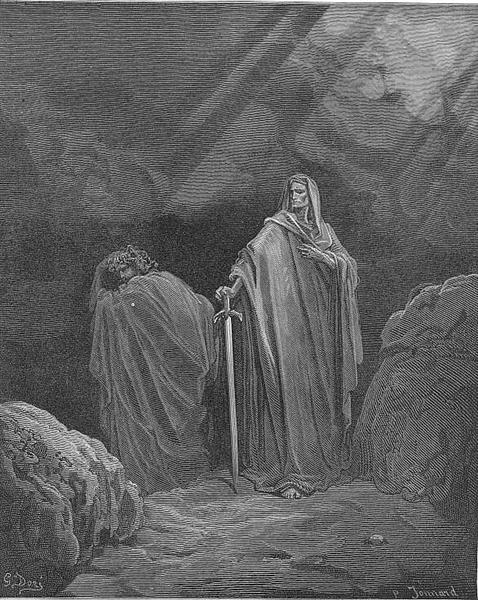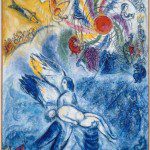
My Lord and my God,
Where the fuck are you?
I know, Father, that you are everywhere and you are nowhere. Nothing can contain you, which is how all things can bear you. And I know that these things, all of these things, bear you to me. Gregory Nazianzus says that you are to us like the reflection of the sun on water: we cannot look upon you directly, but we can see you indirectly.
In all that is. Because you are.
It would be absurd to ask to see you. There is no seeing you. You have no body, no material by which my eyes could perceive you. If invisible means “not for eyes at all,” then you are this.
And if I asked for a feeling, it would be like asking for a sight. Asking you to be some matter that I can know like other things. You are not like anything. How would I know, anyway, whether that feeling was me or you? And isn’t that the wrong question, asking about a thing of mine as if I were apart from you? Surely I am not. Yet I surely am, since I am not you, and you are not me.
If you are everywhere, then I am also never apart from you. Still, I am apart too. Since I am not you. And since I want to know where the fuck you are.
I remember that Augustine in his Confessions asks you where you are. He searches all of himself, even the highest reaches of his own mind. “Surely this is where I have found you,” he says to you. But this, too, is not where you are.
Where then did I find you to be able to learn of you? You were not already in my memory before I learnt of you. Where then did I find you so that I could learn of you if not in the fact that you transcend me? There is no place, whether we go backwards or forwards; there can be no question of place. (Book X, 37)
Augustine finds you in the fact that you are everywhere and nowhere. That you have no place at all. I find you in this, too.
And still I ask: where the fuck are you?
I believe that you were in history. You, divine Son, became man. In our actual history. You were somewhere and somewhen. So specific it hurts, since I am neither there nor then. And even that isn’t quite it, since the Holy Spirit makes your history mine. (And mine was already yours. Could not be apart from yours. All while being mine and not yours.)
I can remember these things and more. Ways to say that you are here, right now, as I ask. As neither of us makes the other not to be.
You act in this world, and I know this too. You make every action in the world possible through your act. Thomas calls you the “primary cause” of all things, the originary and sustaining movement of all that moves. All else, he says, is a “secondary” cause. After the fact, because of the fact. Because of you.
So I don’t even ask my question apart from you. You are in the asking and in the question, in the cause and the term. But you are not the question or its asking. You are always in things that you also are not.
So where are you? And why do I ask?
What do I ask? I cannot really mean that I think you are somewhere that I must find. The question cannot really be about you and you alone, as if you really had some place to be. Do I, then, ask where I am in relation to you? Even if you do not change, I surely do. So perhaps I am the one who moves. But where could I move, near or far or left or right, where you are not as you are?
Thomas says that there is more than one way of relating to everything, of being related. And these relations are always at work, always overlapping, like these great moving invisible cords. A relation does not need a space. I am my brother’s sister whether we are near or far; it is not a term of location, but of relation. That strange Aristotelian thread. Is that it?
Do I ask about a particular way of relating to you? Though you are the same – Thomas says that you have no relation to the world, but it does to you – even as I am not the same?
Somewhere in that tangle.
Then it is somehow my not-the-same that I’m worried about, and I wonder if you’re there too. Are you still there, where I lose everything? And if you are, aren’t you cruel? For being where I am not. For being where in myself I cease to be. If you are there, why would I be glad? Why would I be grateful to my lungs for sustaining a breath that hurts?
This is the mystery I do not understand. (Other than the other ones.) This is the one: where you are when I don’t know where I am. Do you become someone now for me to find? And how the fuck does that help, me knowing where neither of us are? Or if I must find only myself, where the fuck did I go?
I can only say, there we have been: but I cannot say where.
And I cannot say, how long, for that is to place it in time.(T.S. Eliot, “Burnt Norton”)
I suppose I want you to find me. Wherever I am. This is what I ask when I ask you where you are. Find me as if I were lost – and where is that? – and could be found at all. As if this moment could not include the last. As if there could be a time I was lost and now am found. (Says the song.)
But it isn’t like that, is it? This place-not-where? You and I both know that I am some strange admixture, a here and there, a lost and found. You who are everywhere-and-nowhere, and me who is with you and not.
Wherever that is.
However that is.
Because you are.











